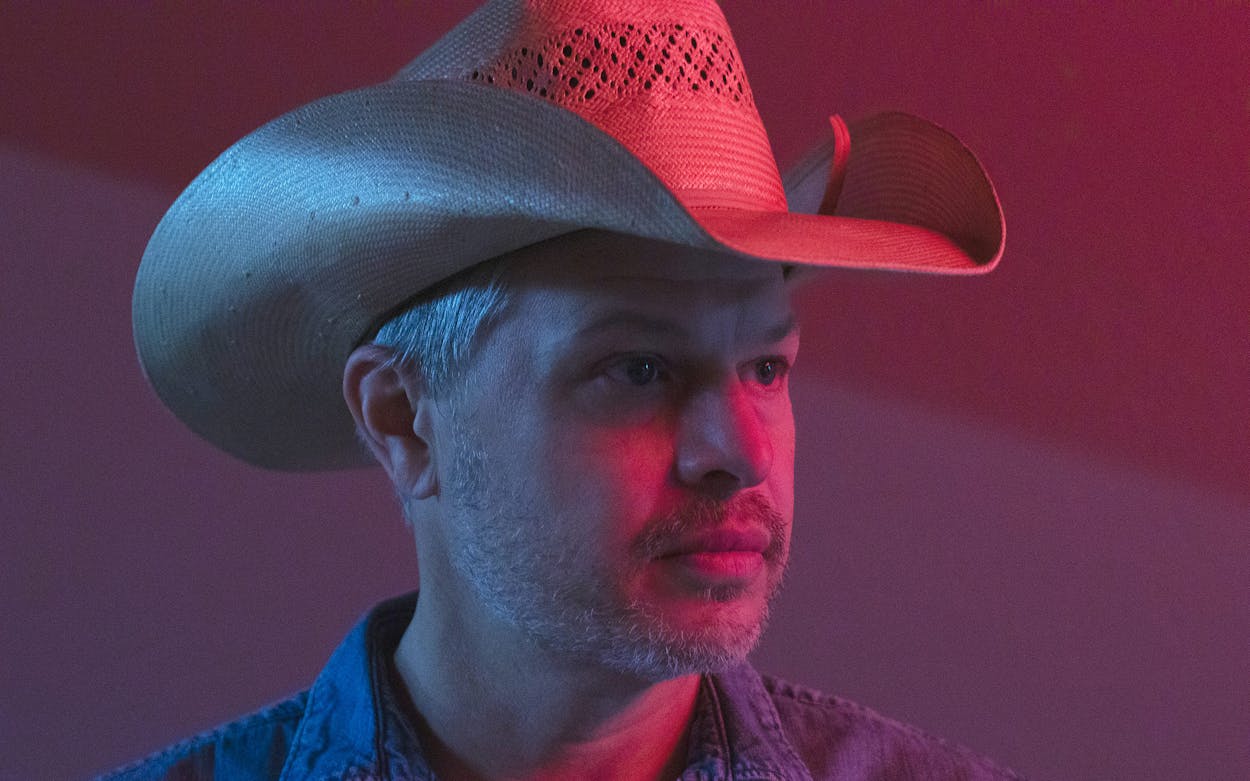It’s tempting to read Jason Boland & the Stragglers’ audacious, surreal, and moving album The Light Saw Me, which drops today, as a response to the COVID-19 pandemic’s myriad miseries. At the very least, it’s the kind of ambitious, zany left turn such seismic global events can prompt from artists. Few who have followed the Oklahoma native’s career over the last two decades would be prepared for what he achieves here: a literary concept album concerned with love and climate change that centers on a nineteenth-century Texas cowboy abducted by aliens and transported to the late twentieth century.
While Light illuminates many themes the pandemic threw into relief—isolation, loneliness, and the purpose of a life—the Austin-based Boland insists these topics preoccupied him long before supply-chain snarls and vaccination mandates. None of Light plays like overwrought homework or feels like an artist’s reach exceeding his grasp. Instead, these eleven tracks unfold with the confidence born out of a twenty-year career that includes ten studio albums.
“The subject matter is just interests from life, living with what we’ve been exposed to lately, and what all has come out,” Boland told me. “Bands always kick around that idea of ‘One day, I’ll do a concept record.’ This felt like the right time. I’m actually glad we had it well underway before everybody shut down, because I think that would have colored it a little too dark.”
“Too dark” might be a matter of semantics, given that Boland kicks off the album with “Terrifying Nature,” singing in its chorus: “So few are ever ready to be chosen / Some of them jump and fear the fall / Take a look around, the void is closing in / On the terrifying nature of it all.” It’s a heady philosophical sentiment somewhat cushioned by the swirl of pedal steel, fiddle, acoustic guitar, and electric guitar filtered through what sounds like an amplifier manufactured on Mars.
Boland feels that the sounds made on Light are of a piece with the Stragglers’ output to date, but there’s an undeniable scope and heft to these songs. The album strives for another level of sophistication. “A Tornado & the Fool” stretches for nearly six minutes, building to an almost frenzied climax, while “Straight Home” has the foreboding undertow of classic folk songs like “The Long Black Veil,” but is updated for a technology-addled present. “Feeling all alone / While surrounded by ghosts / Staring down at their phones,” Boland sings, backed by mandolin, eerie electric-guitar lines and mournful pedal steel.
To help bring Light to fruition, Boland tapped Shooter Jennings to serve as producer. The pair had cut 2013’s all-analog LP Dark & Dirty Mile together. “When I got to the studio, Jason had the whole record written in order and down to, like, the amount of time on each side,” Jennings told me. “He said, ‘Well, you want to just record it from the top?’ We just dove right in, so it was really a natural thing.”
As wigged-out flourishes go, it’s hard to top the spoken-word interludes by Ken Layne, host of the Desert Oracle Radio podcast, which is billed as “a weekly road trip through the weird American desert.” His intonations over instrumental tracks—“One of those rare and purposeful beams of light that we’re told strike individuals at key moments in their life,” Layne rumbles, in part, during “Transmission Out”—catapult the record to a new level of eccentricity, even as they underline Boland’s commitment to the story and the feelings of romance and melancholy he’s working to convey. However you feel about Light when it finally fades out, it’s hard to doubt Boland’s artistic conviction.
“The spirit of it is still just when the muse really moves you in that direction of ‘this is gonna tickle you; this isn’t going away,’ ” Boland said. “Then the whole project hit that point of, ‘This isn’t going away. This is what you’re doing. And it’s going to be fun to just do it.’ Thankfully, people like . . . our fan base, they know by now.”
That fan base is fiercely devoted, but it also, frustratingly, feels undersized for Boland’s talents and abilities. He’s long been a key figure in the Red Dirt country movement—the porous subgenre imbued with sounds from Oklahoma and Texas. But despite his continued accomplishments and accolades, he has yet to break through to the next stratum of success.
There’s a feeling around Boland’s camp that Light could be the catalyst for a new, more visible phase of his career. On December 7, four days after Light’s release, Boland is slated to make his debut appearance at country music’s mecca: the Grand Ole Opry in Nashville, an honor about which he said he is “flattered.” Perhaps his creative instinct—the one which spurred him to turn his gaze toward the deepest reaches of the galaxy to better frame profoundly human, earthbound matters—was dead-on. Only by focusing on the stars could Jason Boland potentially become a bigger one himself.
- More About:
- Music
- Country Music
- Austin






